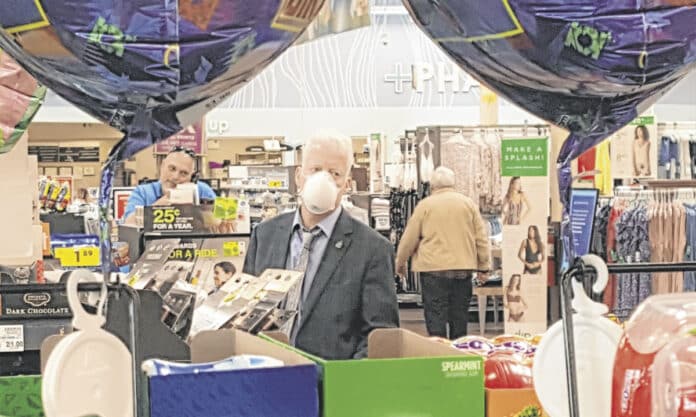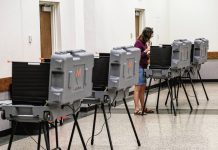
By Tom Jekel
Republic Guest Columnist
It used to be just the bad guys who wore masks, trying to keep their identities hidden while committing crimes. Now the good guys are wearing masks, too — to prevent themselves and others from getting sick.
The number of coronavirus cases and deaths keep increasing, and Bartholomew County families have no longer been spared the grief of losing a loved one.
“I’ve never seen anything like this,” Sheriff Matt Myers said. “We have to keep the front line of public safety healthy. And we have to keep our medical people at the hospital healthy. If we lose that, we lose total control of our community and we can’t have that.”
Public safety officers are expected to put on a brave face when protecting the public in dangerous situations, but these are unprecedented times and fear is a normal human response.
“We have police that are scared,” said Myers, a 29-year law enforcement officer. “I’m fearful right now.”
The sheriff considers anyone who isn’t afraid to be a danger to themselves and the community.
When facing a crisis, the public take its cues from leaders. So when Myers goes out for essential needs, such as trip to the grocery, he wears a protective mask and rubber gloves.
“One of the reasons I wear that stuff is to let people know this is serious,” Myers said. “They look at us and our actions to see how they need to act.”
Myers has been following this practice since Indiana Gov. Eric Holcomb issued his initial stay-at-home order effective March 24, since extended to April 20.
The first week, other grocery store shoppers were shaking their heads and making fun of the way he looked.
Seven days later on April 3, nearly half the shoppers and employees in the same grocery store could be seen wearing masks, including bandanas, scarves and other facial coverings. That was the day the Centers for Disease Control and Prevention began recommending people wear cloth face coverings in public to prevent the spread of COVID-19.
Although his department has enough of the highest-rated N95 respirators — which filter out 95% of all particles in the air including bacteria and viruses — for field officers, the mask Myers wears in public is the type people might use when they are mowing the grass.
With a spike of coronavirus cases projected over the next six weeks, Myers stresses that everyone do whatever they can to prevent the virus’ spread.
“If they aren’t worried about it for themselves, then worry about it for your fellow community member or neighbor. That’s how we’re going to beat this,” Myers said.
The sheriff’s department has overhauled how it does business as a result of the pandemic.
It keeps as few essential employees as possible in the office, rotating their schedules over three shifts.
The administrative team — the sheriff, two majors and three captains — has not been in the same room for three weeks. Had one of them gotten sick while working in the midst of others, it could have wiped out the whole leadership team for 14 days in quarantine.
For deputies, the department has gone to 12-hour shifts and platoons. For example, five deputies in a platoon will be on the road or responding to calls. Another five will be on standby, decontaminating squads or their personal equipment — and be ready to go out if needed.
When officers get home, they remove their uniforms in the garage — and take them directly to the washing machine.
They also leave leather gear in the garage after wiping it down.
Before corrections workers enter a cell block, they must be wearing gloves and masks. And before inmates are brought in, they get their temperatures taken to limit the risk of the virus spreading through the jail.
While violent offenders are still being incarcerated, suspects arrested on lesser offenses are being cited and released to limit risk of an outbreak in the jail, Myers said.
And for now, no family members are allowed into the jail for visitation — a personal hardship, Myers recognizes, but a necessary one.
Prior health epidemics and pandemics also changed the way law enforcement went about its business. That includes the AIDS/HIV pandemic, which began in the early 1980s and has since claimed 25 million lives worldwide.
“I was in college and I was scared to death,” Myers said. “I remember thinking, praying, ‘Please find a cure for AIDS.’”
A nationwide alert was issued in March 2015 on the synthetic opioid fentanyl as a threat to health and public safety. Since exposure to fentanyl can be deadly, new field protocols for first responders treating drug overdose victims were issued.
Myers said it’s too early to tell if this pandemic will be worse than the previous ones.
“With AIDS, we didn’t have all of the answers on how it was transmitted. It took several years to understand it. I think it’s the same thing with this,” he said.
Dr. Anthony Fauci of the White House Coronavirus Task Force has suggested that a second wave of COVID-19 will return after the first one subsides.
“You may be able to go back to work in a month, but it’s going to look different than when you left,” Myers said. “Employers are going to have to do more to keep people safe. And people will have to do more to keep themselves safe.”
Myers has changed his daily routines, spraying his personal office with disinfectant and wiping down surfaces before beginning work.
“Stay at home. Keep your house clean. Use hand sanitizer if you’re out. People can reduce the risk if they listen to health officials and what the state and federal government is putting out,” Myers said.
But don’t look for deputies to enforce stay-at-home measures if people ignore them.
“We are not issuing tickets. We are not stopping cars. We are answering calls for service,” Myers said.
While his heart goes out to people who have suffered from the virus and to families whose loved ones have died, Myers expressed optimism about our future.
“We will get through this. We will learn from this. And we will all be better from this,” he said.




